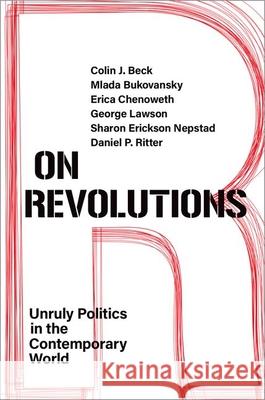


ISBN-13: 9780197638354 / Angielski / Twarda / 2022 / 260 str.
ISBN-13: 9780197638354 / Angielski / Twarda / 2022 / 260 str.
Six of the most thoughtful, important, and interesting scholars of revolution and related matters draw from diverse and different perspectives to offer a powerful reconsideration of revolution today. Embracing multiplicities, rejecting staid binaries, boldly reimagining what revolution might be (and for whom, when and where and how), these scholars reconsider revolutionary studies and show us where it might fruitfully go.
Colin J. Beck is Associate Professor of Sociology and affiliate of the International Relations Program at Pomona College. He is the author of Radicals, Revolutionaries and Terrorists (2015). His work on revolutionary waves have won article awards from the American Sociological Associations sections on Global and Transnational Sociology, and Peace, War, and Social Conflict. Mlada Bukovansky is Professor of Government at Smith College in Northampton Massachusetts. Her research is situated at the intersection of the disciplines of international relations, history, and political theory, and is broadly concerned with the evolving institutions of world politics. Her publications include Legitimacy and Power Politics: The American and French Revolutions in International Political Culture (2002), Special Responsibilities: Global Problems and American Power, with Ian Clark, Robyn Eckersley, Richard Price, Christian Reus-Smit, and Nicholas J. Wheeler (2012), and articles in International Organization, Review of International Studies, Review of International Political Economy, and International Politics. Erica Chenoweth is the Frank Stanton Professor of the First Amendment at Harvard Kennedy School, and a Susan S. and Kenneth L. Wallach Professor at the Radcliffe Institute for Advanced Study at Harvard University. They have written or edited nine books on political violence and nonviolent resistance, including Civil Resistance: What Everyone Needs to Know (Oxford, 2021). Chenoweth directs the Nonviolent Action Lab at Harvard's Carr Center for Human Rights Policy, where they study political violence and its alternatives. Foreign Policy magazine ranked Chenoweth among the Top 100 Global Thinkers in 2013 for their efforts to promote the empirical study of nonviolent resistance. In 2014, Chenoweth received the Karl Deutsch Award, which the International Studies Association gives annually to the scholar under the age of 40 who has made the greatest impact on the field of international politics or peace research. Their book with Maria J. Stephan, Why Civil Resistance Works (2011) won the 2013 Grawemeyer Award for Ideas Improving World Order and the 2012 American Political Science Association's Best Book Award. Along with Jeremy Pressman of the University of Connecticut, Chenoweth is founding co-director of the Crowd Counting Consortium, a collaborative public interest project that collects data on the size of political crowds protesting within the United States since the first Women's March of 2017. George Lawson is Professor of International Relations at the Australian National University, having previously taught at LSE and Goldsmiths College. He is the author of two books on revolutions: Anatomies of Revolution (2019) and Negotiated Revolutions: The Czech Republic, South Africa and Chile (2005). Lawson also applies his interest in history-theory to debates around global modernity, most notably in a book (co-authored with Barry Buzan), which charts the ways in which a range of important dynamics in contemporary international relations have their roots in the 19th century 'global transformation'. His work has won the Francesco Guicciardini Prize and the Joseph Fletcher Prize, both from the International Studies Association, and the Hedley Bull Prize from the European Consortium of Political Research. Sharon Erickson Nepstad is Distinguished Professor of Sociology at the University of New Mexico. She has been a Visiting Scholar at Princeton University's Center for the Study of Religion and at Notre Dame University's Kroc Institute for International Peace Studies. Her books include Nonviolent Struggle: Theories, Strategies and Dynamics (2015) and Nonviolent Revolutions: Civil Resistance in the Late Twentieth Century (2011). Both of these books, published by Oxford University Press, won the Outstanding Book Award from the American Sociological Association section on Peace, War, and Social Conflict. Her other books include Catholic Social Activism: Progressive Movements in the United States (2019); Religion and War Resistance in the Plowshares Movement (2008); and Convictions of the Soul: Religion, Culture, and Biography in the Central America Solidarity Movement (Oxford, 2004). Daniel P. Ritter is Associate Professor of Sociology at Stockholm University. He is the author of The Iron Cage of Liberalism: International Politics and Unarmed Revolutions in the Middle East and North Africa (Oxford University Press, 2015) and co-author of Social Movements and Civil War: When Protests for Democratization Fail (2017).
1997-2026 DolnySlask.com Agencja Internetowa







